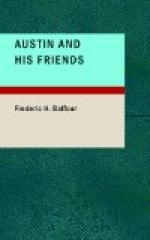“Well, and what have you been about?” he said, after a few preliminaries had been exchanged. “Reading and dreaming, I suppose, as usual?”
“I’m afraid I’ve done both, and very little else to speak of,” replied Austin, laughing. “I’m always reading, off and on, without much system, you know. But if I’m rather desultory I always enjoy reading, because books give me so many new ideas, and it’s delightful to have always something fresh to think about.”
“Yes, yes,” rejoined St Aubyn. “I don’t know what you read, of course, but it’s clear you don’t read many novels.”
“Novels!” exclaimed Austin scornfully. “How can people read novels, when there are so many other books in the world?”
“Well, what have you been reading, then?” enquired St Aubyn, lighting a cigarette.
“I’ve been dipping into one of the most puzzling, fascinating, bothering books I ever came across,” replied Austin, following his example. “I mean ‘The Garden of Cyrus,’ by Sir Thomas Browne. I can’t follow him a bit, and yet, somehow, he drags me along with him. All that about the quincunx is most baffling. He seems to begin with the arrangement of a garden, and then to lead one on through a maze of arithmetical progressions till one finds oneself landed in a mystical philosophy of life and creation, and I don’t know what all. If I could only understand him better I should probably enjoy him more.”
St Aubyn smiled. “Well, of course, it all sounds very fanciful,” he said. “One must read him as one reads all those curious old mediaeval authors, who are full of pseudo-science and theories based on fables. His great charm to me is his style, which is singularly rich and chaste. But I’ve no doubt whatever, myself, that a great deal of this ancient lore, which we have been accustomed to regard as so much sciolism, not to say pure nonsense, had a germ of truth in it, and that truth I believe we are gradually beginning to re-discover. You see, one mustn’t always take the formulas employed by these old writers in their literal sense. Many were purely symbolic, and concealed occult meanings. Now the philosopher’s stone, to take a familiar example, was not a stone at all. The word was no more than a symbol, and covered a search for one of the great secrets—the origin of life, or the nature of matter, or the attainment of immortality. They seem to us to have taken a very roundabout route




